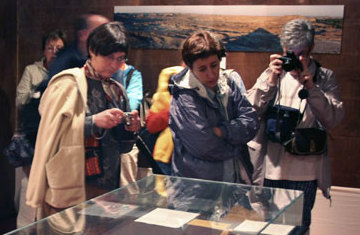
Above: Tourists view the a replica of hominid “Lucy” at a
Museum in Addis Ababa recently.
The Daily Nation, Kenya
By HENRY OWUOR in Addis Ababa
Tuesday, February 3 2009
Why Ethiopian capital is unique
Addis Ababa or Addis Abeba or “new flower’’ in Amharic is what one can rightly call, in some well known parlance, a “peculiar’’ city.
There are many factors that make this city very unique. One of these is the fact that the city was never planned by Europeans since Ethiopia was never colonised.
Given its unique history, in Addis, street names hardly exist and the few that exist have their local names that are not the ones that are displayed.
In Addis, if you tell a taxi driver to take you to Ethio-China Street, he will have no idea what you are talking about. But, if you say the street is known as Wollo Sefer, he will have no problem getting there. Or if you say, take me to Nigeria Street, no response, but if you say Posta Bet, you will soon be there.
In this city, hardly any violent crime exists and carjackings are very rare.
Addis is a place where shops just leave used soda bottles on the verandah and no one steals the crates or the bottles.
Says Mr Jason McLure, the Ethiopia Correspondent for Bloomberg news agency: “Addis Ababa is the safest city in Africa. If someone tries to pick your pocket, you just shove them away, they won’t pull a gun or a knife on on you.’’
But, Addis is actually a very cold place, especially at this time of the year and as such malaria is not a problem here.
As a city that was created by a king, Addis is very hierarchical and residents hardly question any government policy.
Since Ethiopia was among the first places on earth to be christened, it has its own alphabet, its own church and its own calendar which currently says the year is “2001” and last year, they celebrated the millennium.
In the Ethiopian calendar, there are 13 months in a year hence the delay of their millennium. Tourism brochures talk of ”13 months of sunshine.”
In Ethiopia, the word “Queen of Sheba’’ is very common. This originates from the fact that one of the Israeli kings, Solomon had an Ethiopian wife known as Sheba and the city Addis was created by one of the direct descendants of Solomon, Emperor Menelik who was taking orders from his wife who insisted that he must move his palace to Addis Abeba, the new flower.
Another peculiar fact about Ethiopia is that unlike most of Africa, here, people dance with their shoulders, not the hips but this applies mostly among the northerners.
And in Ethiopia, if you order a drink, the drink can never be opened if you are away because there are beliefs about magic being applied on the drink.
There is also what is called Injera which is the Ethiopian standard food. Here, only the very poor eat maize and as such the price of maize meal is much lower than ‘’injera,’’ even under famine conditions, Ethiopians stick to injera.
Raw beef
What will also strike foreigners as very strange is that Ethiopians eat raw beef right in the heart of the capital city. This is a meal that is served to the most respected guests.
In terms of holidays, the most important festival is not Christmas. The most important holiday in Ethiopia is “Timkat’’ which marks the baptism of Jesus Christ by John the Baptist, marked on January 19.
The second most important holiday in Ethiopia after “Timkat” is Meskel which celebrates the finding of the “true cross’’ that Jesus was crucified on. Legend has it that an Ethiopian found it and brought it here but ask, where is the cross? No one seems to have an idea.
The third most important holiday in Ethiopia is Christmas which comes nine days after the Christian Christmas under the Orthodox calendar.
And, there is another unique event in Ethiopia. This involves large groups of worshippers outside any Orthodox church in Addis Ababa on any Sunday.
The reason here is that under church rules, anyone who has had sex in the last 48 hours or any woman who is on her periods should not enter church.
This rule extends to holy islands on Ethiopia’s Lake Tana where monks live and where no woman is allowed, the monks are not supposed to interact with any woman or even set eyes on any woman.
More from Daily Nation


























There’s a lot in this book, although as Steph said, it’s all conveyed with very simple and immediate prose. ,